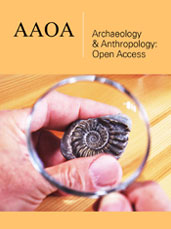- Submissions

Abstract
Archaeology & Anthropology: Open Access
Risk of Generalizing Parents’s Narratives in South African Literature: South African Ethnography for Engaging Leading Organizations for Inclusive Assistance
-
Open or CloseMxolisi Gwala*
School of Social Sciences, University of KwaZulu-Natal, South Africa
*Corresponding author:Mxolisi Gwala, School of Social Sciences, University of KwaZulu-Natal, South Africa
Submission: August 12, 2025;Published: September 05, 2025

ISSN: 2577-1949Volume5 Issue4
Abstract
This article explored notable examples of cross-cultural studies on the experiences of disability through a comprehensive literature review. It primarily focused on the feelings and experiences of parents caring for their children, as drawn from existing literature. The findings generated from the life histories of parents demonstrate varying perceptions and societal attitudes towards cognitive disabilities, emphasizing the impact on individuals and their families. Central to this discussion was the United Nations Educational, Scientific and Cultural Organization (UNESCO), which has established itself as a major global agency for promoting world peace and security through international cooperation in education, arts, sciences and culture and monitoring health issues, including the mental strain that parents endure in the process of caring for a child with disability. Literature provided extensive dimensions for understanding the intersections between personal, social and environmental factors that influence the experiences of parents as caregivers of children with cognitive disabilities. The key findings reveal that parents often feel dejected because communication about narrative reporting, urgency and long-term support for caregivers of children with cognitive disabilities in many local schools in South Africa lacks cultural relativism. This gap remains despite the impact of historical factors such as colonization, apartheid, gender, socio-economic status, and education on disability experiences. This review contributes to the academic discourse on cognitive disabilities and offers practical implications for policymakers and practitioners aiming to enhance support for affected families. By exploring the dimensions of literature, the article advocates for urgency and intent in representing and supporting systems for inclusive practices in education and community settings, as derived from relevant ethnography.
Key Topic Breakdown and Key Words Ethnographic insights
Refers to anthropological in-depth studies or observations about people’s lives and cultures.
Reporting case-specific narratives
This is telling detailed specific (cultural context) stories or giving examples about subjective parental experiences.
Caregivers of children with cognitive disabilities
In the context of this paper, these were either biological, culturally and legally recognized parents or guardians who had children living with cognitive disability.
To the United Nations Educational, Scientific and Cultural Organization (UNESCO)
This means that the information is being shared with a global agency for promoting world peace and security through international cooperation in education, arts, sciences and culture.
Keywords: Literature; United nations educational scientific and cultural organization (UNESCO); Ethnography; Case-specific narratives; Local setting; Culture sensitivity; Cultural relativism; Education for All EFA; Teacher assistance; Urgency; cognitive disability
Acknowledgment of Key Cross-Cultural Studies Contributing to Understanding of Disability Experiences
These studies contribute to a more comprehensive knowledge of disability by emphasizing the various cultural settings and practices that impact the lives of people with disabilities across worldwide.
The who world report on disability
The World Health Organization’s comprehensive study covers disability in a variety of different countries, stressing the social, economic, and environmental aspects that influence people with disabilities worldwide.
The disability studies quarterly
This journal often features cross-cultural studies that explore how different societies perceive and address disability, offering insights into diverse cultural contexts.
The global burden of disease study
Examines the global impact of disability, gathering information on the prevalence and implications of various disabilities across cultures and geographies.
The International Classification of Functioning, disability and health (ICF)
The ICF framework, developed by the WHO, is used globally to comprehend disability holistically, considering biological, individual, and societal aspects across cultures.
Cultural models of disability project
This research looks into how diverse societies relate to and react to disabilities, exploring the beliefs and practices that surround disability in various countries.
Comparative studies on education and inclusion
Focus on research about educational methods for disabled children in many nations, focusing on how cultural views influence inclusive education legislation and practice.
Global perspectives on mental health disability
Research examines how emotional and behavioral disorders are understood and managed in various cultural contexts. It indicates differences in stigma, support systems, and treatment approaches.
 a Creative Commons Attribution 4.0 International License. Based on a work at www.crimsonpublishers.com.
Best viewed in
a Creative Commons Attribution 4.0 International License. Based on a work at www.crimsonpublishers.com.
Best viewed in 







.jpg)






























 Editorial Board Registrations
Editorial Board Registrations Submit your Article
Submit your Article Refer a Friend
Refer a Friend Advertise With Us
Advertise With Us
.jpg)






.jpg)














.bmp)
.jpg)
.png)
.jpg)










.jpg)






.png)

.png)



.png)






